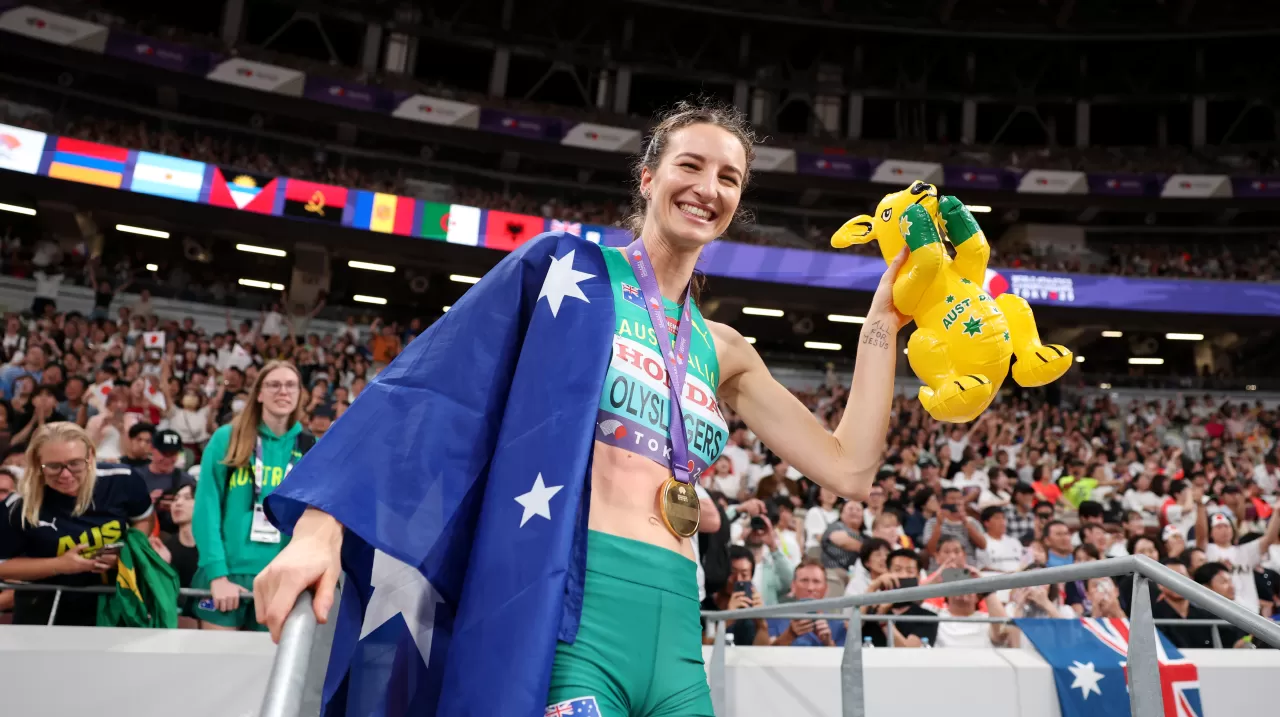And on the last day it rained. Almost from the moment the program for the final day of the world championships got under way the rain started to tumble down.
Like all rain, it felleth on the just and the unjust alike. It might be a question, however, as to whether it fell equally on the discus throwers with the big arms and those who relymore on speed in the circle. For almost the entire competition – which was delayed in any case twice as the rain became just too heavy – the throwing circle was more suitable to Torvill and Dean than the 100kg-plus discus behemoths.
Enough of all that. Everyone talks about the weather, as Mark Twain was said to have once observed, but nobody does anything about it. And an Australian campaign which got stronger as it went was capped with a brilliant gold medal to Nicola Olyslagers in the women’s high jump.
Olyslagers cleared 2.00 metres just before the first long rain delay of the evening. Defending champion Yaraslava Mahucikh also got one jump at what turned out to be the winning height before the stoppage. Others, including Eleanor Patterson and the eventual silver medallist Maria Zodzik had a long wait before attempting 2.00.
Only Zodzik succeeded. Mahuchikh, having fallen behind, passed her two remaining attempts to go to 2.02 but none of the three could clear the height and Olyslagers was world champion, joining teammate Patterson as an outdoor global championship winner. A costly miss first time at 1.97 ended Patterson’s run of consecutive global championship medals.
If only Matt Denny had the same timing with the conditions as Olyslagers Australia may have had two medals on the night. For most of the competition he was in a medal position but a fifth round 66.56 from Alex Rose gave Samoa its first world championship medal and condemned Denny to fourth place.
Sweden’s Daniel Stahl, a strong-arm thrower if ever there was one, produced a final round 70.47 to take his third world championship title ahead of world record holder Mykolas Alekna and Rose. Denny’s best was 65.57.
But it really was a raffle. The first attempt to start the event in steady rain saw Alekna achieve a cautious 62-metre effort before Denny slipped and fell heavily as he attempted his first throw. When throwing resumed after a long delay, Denny was allowed to re-take his throw but Alekna didn’t get to re-take his. It was the first of many puzzling decisions.
In the first few rounds there were as many slips, falls and fouls as there were valid throws. Competitors experimented with all sorts of unconventional footwear, one even throwing in his socks. As throwers slipped in the circle, at the landing end of the sector discs skidded off the wet grass like Curtly Ambrose coming off a Jamaica green-top.
An outdoor discus season which began in the thrower-friendly conditions at Ramona, Oklahoma ended with a contest for the year’s biggest prize that was as much farce as tour de force. You can say the end result was that one of the best throwers of his generation – Stahl – won, the world record holder, Alekna finished second – but the whole competition was conducted in conditions in which the possibility of a serious injury hung over all of the comnpetitors.
The women’s 800 seemed to hinge on the answer to one question. Keely Hodgkinson had come back from a year-long injury absence to run 1:54.71 in Poland a month or so ago. But could she repeat that level of performance having run a heat and semi-final beforehand.
No, she couldn’t, as it turned out, though Hodgkinson did run1:54.91, but that was a hundredth of a second slower than teammate Georgia Hunter Bell who, in turn, was behind Lilian Odira’s gold medal in a championship record 1:54.62. This was some race. Jess Hull could never get on terms this time – the first lap flashed by in 55.67 – but she still produced another 1:57, this time 1:57.30. What a world championships she has had.
The men’s 5000 turned out to be a redemption run for Cole Hocker who won with an unanswerable sprint over the final 230 metres in 12:58.30 from Isaac Kimeli and 10,000 champion Jimmy Gressier. Three times in a row now – Jakob Ingebrigtsen in Eugene and then Budapest, now Hocker – the vanquished 1500 favourite has come back to win the gold medal in the 5000 metres. Seems like losing the 1500 or, in Hocker’s case, getting DQed, might be the key to 5000 glory.
Ky Robinson finished almost as well as Hocker to storm from back in the pack to fourth place in 12:59.61. Following his bronze medal in the world indoor 3000 metres, it has been a big year.
And the relays – the farewell performance of Shelly-Anne Fraser-Pryce in the 4×100 which fell just short of a gold medal, the win by Botswana over the US in the men’s 4×400 – were as entertaining as ever. Even the rain contributed to a memorable night to close Tokyo’s second world championships.


